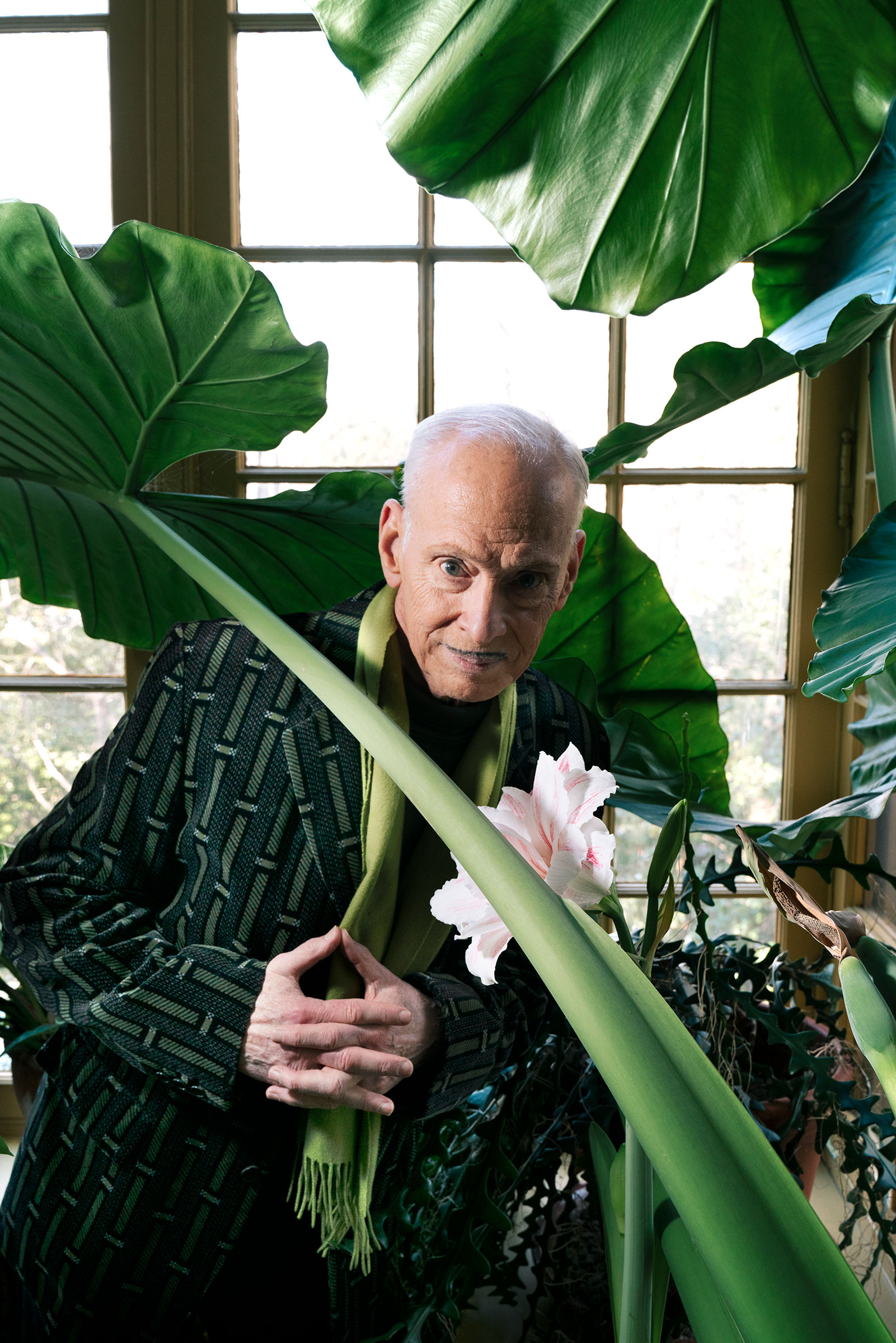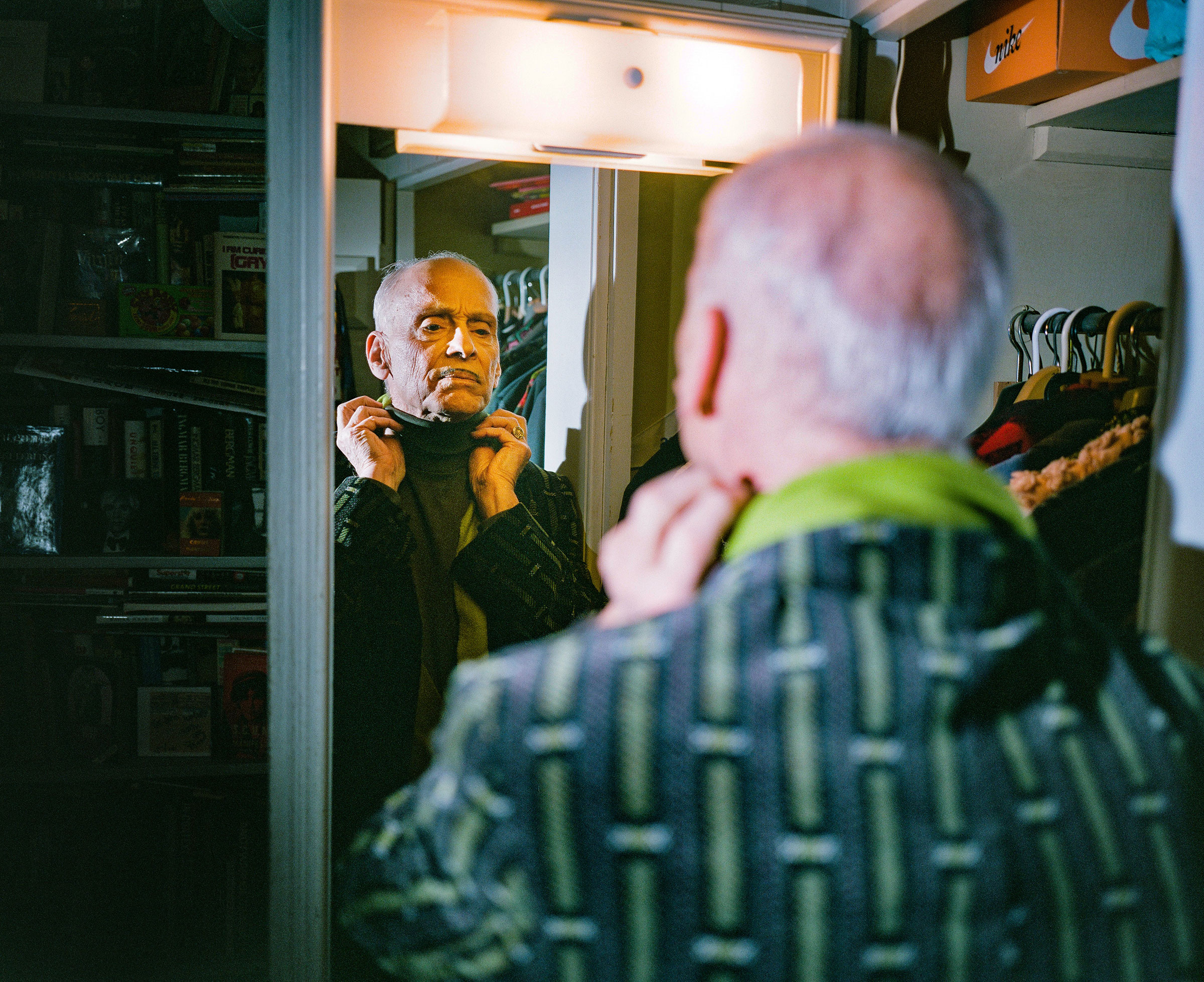
Conventional wisdom holds that 2021’s much anticipated hot vax summer never happened, but John Waters knows different. Cinema’s Pope of Trash rents a home in Cape Cod’s queer party destination Provincetown every summer, and last year “it was like the movie The Swarm, but with gay people,” Waters laughs. Although the season marked the filmmaker, author and cultural icon’s 57th in Ptown, the convergence was like nothing he had seen before. “I hid,” he says, writing in the mornings and spending afternoons on the beach.
The town made headlines in July after hundreds of mostly vaccinated revelers contracted the delta variant there. But Waters blames the state government’s abrupt transition out of masking-and-distancing mode, not his rowdy neighbors, for the outbreak. A self-described “filth elder” who spent his 20s making movies transgressive enough to send his parents’ generation into conniptions, the Pink Flamingos auteur sympathizes with the youth, whose decadent and libidinous urges he knows well. “I feel bad for them,” he says. “They’re quarantined and aroused, horny and lonely. That’s not fair when you’re young.”
Now 75 and no longer a slave to hormones, Waters simply hunkered down and worked through the darkest days of the pandemic. In fact, he tells me over video chat from an art studio in his beloved hometown of Baltimore, he has never been busier than he is right now.
Dressed mutedly in a dark jacket, turtleneck and scarf that offset a backdrop papered with the bright, glittery character portraits that fans mail him via his local bookstore and press into his hands at events, he has ostensibly logged on to promote his guest appearance in the fourth season of Prime Video’s The Marvelous Mrs. Maisel (premiering Feb. 18). The man behind Hairspray and Cry-Baby makes an apt addition to a midcentury showbiz comedy, and Waters had a ball shooting on location in downtown Manhattan. “The whole Village was shut down,” he enthuses. “Behind us were vintage buses, cars, hundreds of extras in costumes. It was old-school Hollywood, in a great way.” But his character is still being kept under wraps, and anyway, he has so many upcoming projects to discuss that he’s had to make himself a cheat sheet.
John Waters Speaks at RISD Commencement 2015
Just two months in, Waters is already booked solid for 2022. In March, he has an art show opening in Baltimore. He’ll celebrate his birthday in April, with spoken-word dates in New York and Atlantic City. (He’s titled his pandemic-era show False Positive.) May brings his biggest release of the year: his debut novel, Liarmouth, for which he’s planning a live book tour, COVID-willing. From there, it’s a marathon of hosting gigs, charity events (he’s staging a gourmet dinner at the P-Town dump to benefit the local film festival), his annual fan confab Camp John Waters in September and a couple dozen performances of his show A John Waters Christmas.

“People say, ‘Why don’t you retire?’” Waters scoffs. “I’d drop dead if I retired. I jump out of bed every day to go to work.” After six decades of productive perversity, slowing down would pretty much require shutting off his brain. “I have to think up something weird every morning!”
Maybe it isn’t so surprising that Waters is more in demand than ever. In some depressing ways, we live in an America his movies anticipated—with charlatans, extremists and malignant narcissists crowding the public square, as constant altercations break out between a repressive far right and a radical-chic far left. The same day I spoke with Waters, Georgia congresswoman Marjorie Taylor Greene gave a bizarre interview decrying “Nancy Pelosi’s gazpacho police” that immediately went viral. (She meant Gestapo.) If you didn’t know better, you might think Greene was a character played by Mink Stole, the Waters lifer who specializes in snippy villains.
The difference between his outré work and the hysterical pitch of our current public discourse—besides, of course, that no one’s drafting laws based on his absurdism—is that his intentions are always playful and good-natured. Waters likes to poke fun at what he still calls “political correctness,” not because he’s joined the self-serious war on wokeness or cancel culture or any other term pundits invoke to protest the march of progress, but because he thinks humor is the best route to social change. He wants to see liberals form mock “pronoun police” forces and hand out tickets. So you want to upstage the insurrectionists who relieved themselves in the halls of Congress? “Maybe we should form fecal flash mobs,” he chuckles.
Liarmouth is very much in this punkish tradition. A road novel with an outrageously Watersian attraction at every rest stop, the book follows self-styled criminal mastermind Marsha Sprinkle and a doting accomplice as they grift their way up the East Coast. (Scammers may be trendy right now, but they’ve been a staple of Waters’ oeuvre since 1970’s Multiple Maniacs cast his friend and muse, drag queen Divine, as a freak-show impresario who robs audiences at gunpoint.) “I think it’s the most insane thing I’ve ever written,” Waters says.
If Liarmouth seems merciless in its skewering of political correctness, he notes that the criticism is intended “in a good way, because I secretly think I am politically correct.” Which is to say, he shares the inclusive aims of today’s activists, minus the appetite for sanctimonious Twitter threads. (Waters’ ubiquity does not extend to social media.) A pioneer of LGBTQ representation—though one whose LGBTQ characters are just as deranged as their straight counterparts—he had a suite of gender-neutral bathrooms named in his honor at the Baltimore Museum of Art this past fall. Elizabeth Coffey, a trans trailblazer who appeared in Flamingos and 1974’s Female Trouble, was the guest of honor at their dedication. “She came down and cut the ribbon and used the bathroom for the first time to christen it,” Waters recalls. “Officials were there, all the news teams. It was an event that really did say something about a serious subject, but in a way that brought everybody together.”
An optimistic read on why everyone wants a piece of Waters these days, and one I’m inclined to embrace, would be that changing times have revealed the humanism underlying his grotesque spectacles. As the aura of transgression surrounding even his earliest, most extreme movies fades, what remains is the filmmaker’s endless fascination with his fellow man. What kind of person wouldn’t adore Tracy Turnblad, the plucky, plus-sized, integrationist heroine of Hairspray? But Waters also has affection for Divine’s monstrously vain Dawn Davenport, from Female Trouble, whose mad pursuit of beauty ultimately lands her in the electric chair.

“Everybody I write about, even the crazy people in Liarmouth—I love them,” he says. “I want to spend time with them. And I’m amazed at human behavior. That’s what keeps me going: to try to understand why people act the way they do. If I didn’t do this,” by which I assume he means make art in any and every feasible medium, “I’d be a good shrink.”
Waters has, in his personal life, made a point of showing kindness to people whom most might judge unworthy of compassion. For years he’s been campaigning for the release of Leslie Van Houten, the reformed and remorseful 72-year-old who has spent half a century in prison for her role in the Charles Manson murders, and whose favorable parole-board decisions have been repeatedly overturned by gubernatorial veto. (She was most recently approved for parole in November, pending California Governor Gavin Newsom’s signature.) “When the worst thing that can happen to you does,” Waters writes in his 2019 book Mr. Know-It-All, “I try to be a friend.”
Would it be fair to say that, throughout a career commonly associated with the gross and the subversive, Waters’ guiding principle has always been radical acceptance? “Completely!” he exclaims, energized. “I try not to judge people’s behavior because I don’t know the backstory.”
For those of us who grew up loving him, it’s gratifying to see Waters, in his filth-elder era, enjoy the same open-mindedness he’s promoted for decades. Call him an accepted radical, cherished by cinephiles and cultists as well as the little kids who flock to him at airports following his cameo in an Alvin and the Chipmunks movie. Waters had a recurring role in the recent final season of madcap millennial self-parody Search Party; one of its stars, John Early, told Seth Meyers that the director “created the entire sensibility that the show lives in.” Waters says he’s flattered by the comparison—and he gets it. “Millennium Maniacs would be a great title” for the show, he jokes, pointing out that his character, who sells babies to gay couples, parallels a story line in Flamingos. (Once banned in multiple countries, that movie entered the National Film Registry last year and will get a 50th-anniversary Criterion Collection reissue in June.)
Waters is, of course, thrilled to support young people in satirizing the pieties and excesses of their generation. “I’ve always made fun of rules,” he says. “In the ’60s I made fun of hippie rules, even though I was in that world and my audience was in that world. But there’s always extreme people, in all worlds, that can laugh about it. And I think they’re the survivors.”
More Must-Reads from TIME
- Why Trump’s Message Worked on Latino Men
- What Trump’s Win Could Mean for Housing
- The 100 Must-Read Books of 2024
- Sleep Doctors Share the 1 Tip That’s Changed Their Lives
- Column: Let’s Bring Back Romance
- What It’s Like to Have Long COVID As a Kid
- FX’s Say Nothing Is the Must-Watch Political Thriller of 2024
- Merle Bombardieri Is Helping People Make the Baby Decision
Contact us at letters@time.com